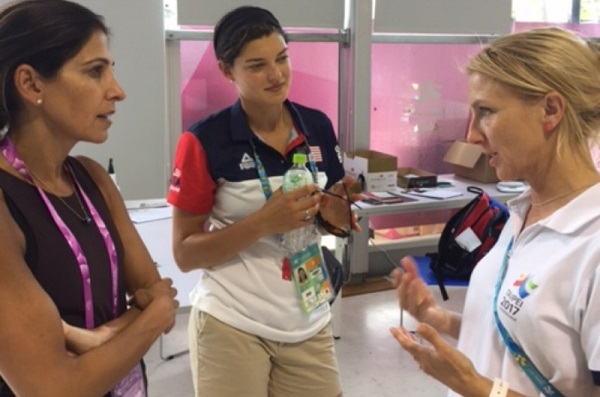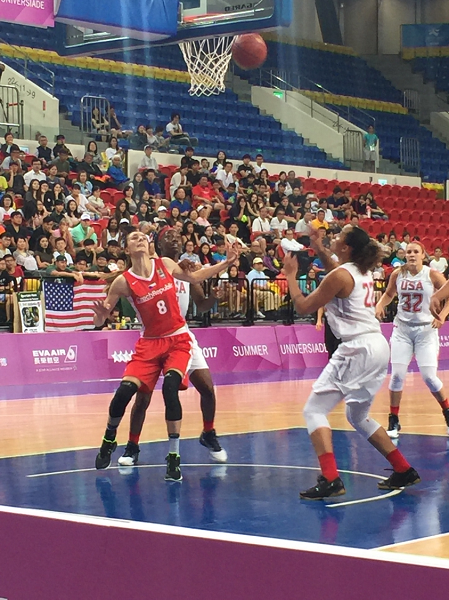Drexel Nutrition Students 'Jump In' at the 2017 World University Games
September 17, 2017

Drexel University’s Department of Nutrition Sciences fueled the USA team during the
29th World University Summer Games (WUG) held in Taipei, Taiwan from August 19–30. With 7,700 student-athletes from 131 countries competing in 22 sports, it is the second-largest multisport event on the globe—only the Olympics are bigger.
Team USA is represented by over 400 student-athletes from more than 70 NCAA teams to showcase their talents on a world stage. Team Drexel Nutrition, which provided nutrition guidance for the American athletes, was led by four Drexel graduate students and University faculty from the College of Nursing and Health Professions.
On the front lines, graduate students Coco Ellis ’17, Leah Tsui ’17, Kylie McKenzie ’18 and Kira Sy ’18 worked around the clock to keep the Games going—something they have prepared to do for over a year. Every day during the Games, these Dragons assisted in the athletic training room and in the athletes’ village dining hall. They gained valuable experience in working with world class athletes, learning about large scale food delivery systems within a sports context and getting a behind the scene look of an Olympic-size sporting event.
Of course, learning by doing is one of Drexel’s pedagogic staples, and it fit well with the WUG.
Stella Volpe, PhD, chair of the Department of Nutrition Sciences, encouraged Drexel’s involvement with the Games, stating that, “the amazing work Dardarian and her team does, extends throughout the entire world, and will continue, since she has been asked to be the USA team's sports dietitian again in the 2019 Games.”
The students not only lived in the athletes’ village—they also had gotten to know the athletes and occasionally attended events to cheer for them.
“I am grateful for the opportunity I was given to not only represent the USA team, but also Drexel University,” said Ellis. “Drexel stood out from other universities due to the emphasis they place on experiential learning.”
Overseas and on the job, the students got a taste of that experiential learning while working with athletes from all different backgrounds.

“There were vast differences in nutritional knowledge that the athletes competing there had,” said Ellis. “Not only did it vary between countries, but also within countries, and even within specific sports.”
One of the most interesting facts is that the Taiwanese do not know much about food allergies. Accurately labeling foods with nutrition information including allergens was one of the most difficult tasks, since the information was simply not available. Neither were gluten-free foods. A small table with five boxes of gluten-free cereal were controlled for distribution to athletes diagnosed with celiac disease.
“It was eye-opening to see what foods athletes were familiar with, and what new foods they were willing to try in a new place,” said Tsui. “The athletes at this level know good nutrition is essential to their performance, so it is interesting to see how they filled up their plates! As part of the research we were able to do there, we took pictures of athletes' plates to see how they fueled for a game or recovering from a workout.”
Surprisingly, or maybe not, popcorn chicken was the most popular food item among the athletes. Another “nugget” of the Games for the Drexel students was 16-hour flights to travel to Taiwan and a 12-hour time difference.
The WUG also had a Drexel “feel” on the courts and fields. Drexel University junior and member of the Dragons women’s basketball team Tess Kracikova was representing the Czech Republic. Eve Badana, a graduate student and former Drexel women’s soccer goaltender, returned to the games to compete for Ireland.
By: Nyree Dardarian